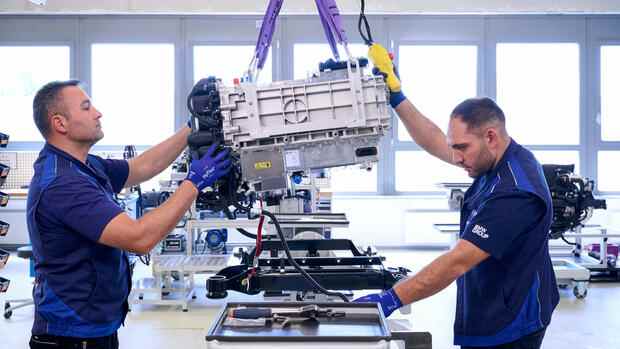Fuel cell from BMW under discussion: Does the niche product have a chance in Germany?
(Photo: dpa)
The German automotive industry has made a commitment: After the combustion engine comes the electric drive. Volkswagen, Mercedes and BMW are rebuilding their factories at full speed and from the middle of the decade the electric cars have the right of way.
But the more concrete the conversion becomes, the closer the age of cables and batteries approaches, the bigger the questions become: are cobalt and lithium enough for tens of millions of electric cars? Will there be enough charging stations for all electric cars all over the world? Are there any other alternatives?
The doubts grow. And it is certainly no coincidence that the discussion about synthetic fuels is gaining momentum again when the new VW boss Oliver Blume takes office. Today they are absurdly expensive and inefficient. But you don’t want to take them off the agenda either. Like the rest of the industry, Blume needs at least the feeling that somewhere there is still a way out of the purely electrical course.
The same applies to the discussion about an old acquaintance in the industry, the fuel cell. BMW boss Oliver Zipse is now bringing this back into play. The unsuccessful attempts by Mercedes and Toyota to bring the technology onto the market do not deter him.
Top jobs of the day
Find the best jobs now and
be notified by email.
Ironically, the smallest German car company now wants to bring the hydrogen-powered fuel cell into large-scale production in a small series from 2025 with the model change to the “new class”. BMW, with a global market share of 3.4 percent, is attempting a niche technology.
The dream of hydrogen as a “new diesel”
One thing is clear: Without allies, BMW will fail with the project. Geographically, this could be Japan and South Korea, where hydrogen is set to become a cornerstone of the energy supply.
In this country, the scarce green hydrogen is initially reserved for the chemical industry and steelmakers. But the truck manufacturers Daimler, Volvo and the VW subsidiary MAN are flirting with fuel cells for heavy trucks and long journeys, even if their car offshoots are still skeptical.
If the truck manufacturers opt for hydrogen, the BMW bill could add up and a dense network of filling stations could emerge. In the best case, hydrogen will make the career of diesel, which once made the leap from trucks to car engines and ultimately dominated the industry.
But it’s a very long way for BMW to get there. Especially because the Munich company, unlike Mercedes and Volkswagen, lacks a truck subsidiary.
More: Hydrogen in the tank: BMW plans with the fuel cell
